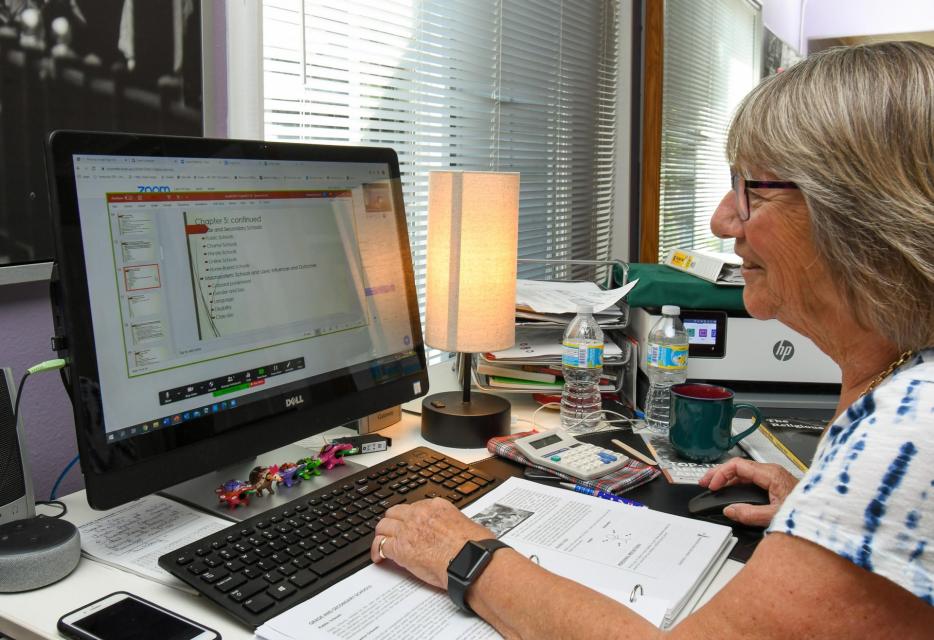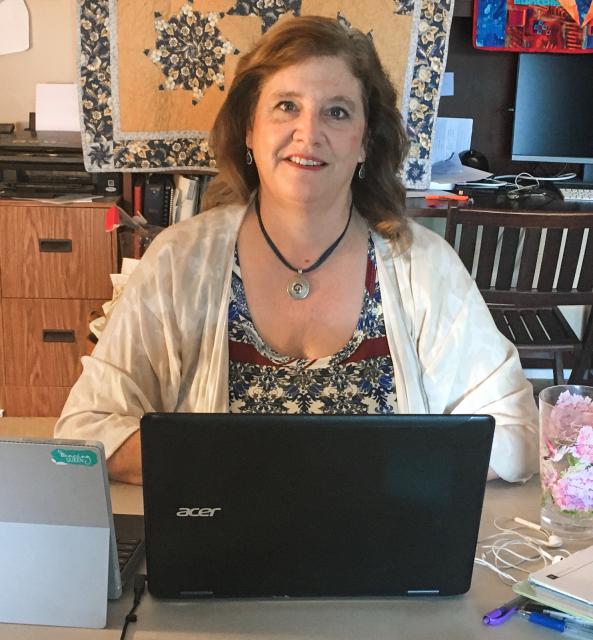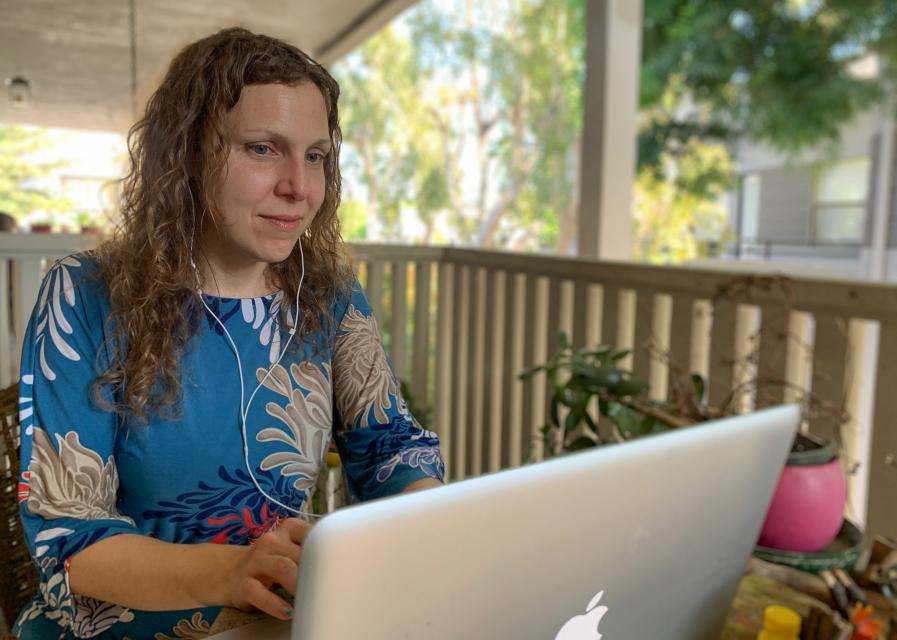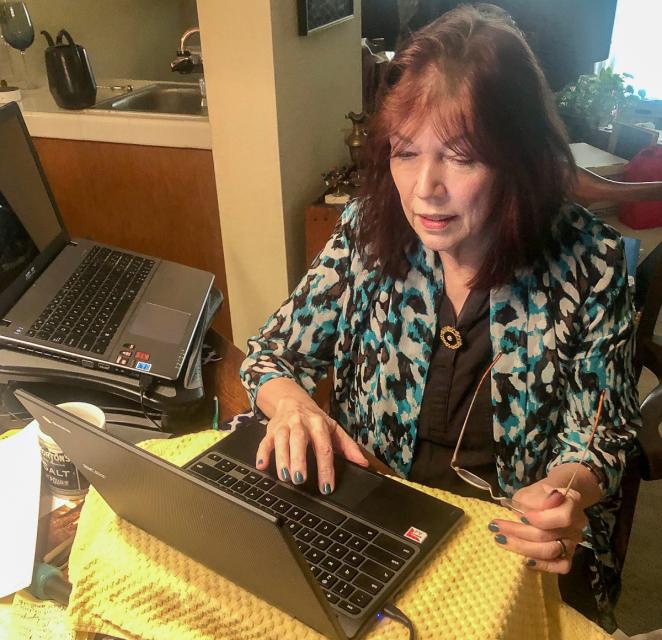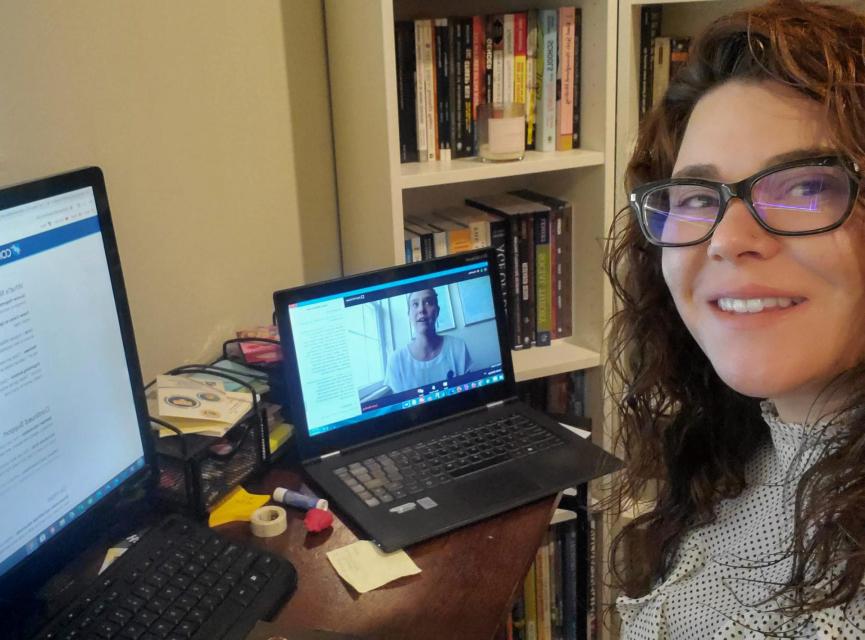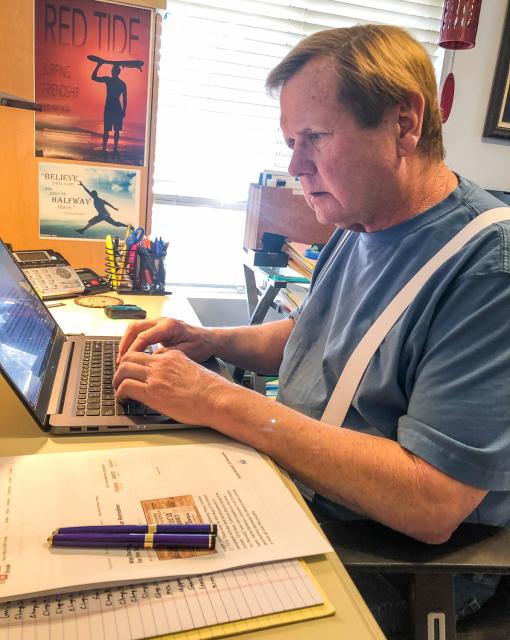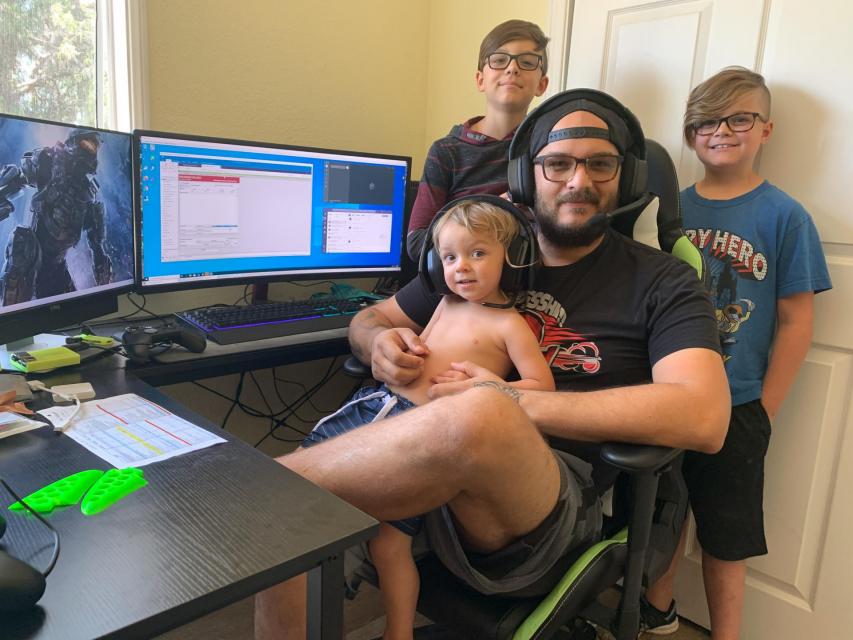Palomar College child development teacher Barbara Hammons definitely found the idea of distance teaching a challenge. For years, she and her department chair had a running joke – if she ever wanted to get rid of her, no need to fire her, just give her an online class.
After Californians were ordered to stay at home and schools closed, Hammons spent a couple of sleepless nights fretting about it, unable to believe she would be capable of making the switch from the classroom to online. But she knew she’d have to or give up teaching, which she loves.
“I’m a face-to-face person — that’s my forte,” she said. “My fear was that I couldn’t give my best to students online. But I’m absolutely shocked at how well I’m doing. I actually enjoy it.”
Hammons says she’s learned how to correct papers online, do discussion boards, and grade and upload tests, among other things. She loves that she’s saving paper, and she’s found some of her students find it easier to share things online than in the classroom.
“I’ll tell you what, I’m sold,” she said. “I’m a good example that you can teach old dogs new tricks.”
A member of the executive board of her union — the Palomar Faculty Federation, AFT Local 6161 — Hammons credits fellow union members, like her union co-president for part-time faculty, Barbara Baer, and a fellow board member and business teacher, Anastasia Zavodny, with helping her learn how to conduct classes online.
“They were always available and there to help every step of the way,” she said. “They said, ‘Barbara, you can do it, I know you can.’ They gave me the confidence I never thought I had. They believed in me, so I believed in myself.”
Now, much to her surprise, Hammons is sharing her newfound knowledge.
“I’ve been showing my friends Zoom,” she said. “One is going to teach online, so I’m helping her now. When people help you from kindness of the heart, you want to pass that on.”
• • •
Leslie Blackie, a biology teacher at Oakland’s Laney College and the program director of biomanufacturing there, says she misses the contact with her students. Holding a lab class online holds particular challenges.
“If they’re going to look down a microscope, I can find pictures of what they might see,” she said. “I can generate data and have them analyze it, but it’s not the same as when they generate it themselves. Even though we’re doing a pretty good job of educating remotely, it’s not the same as being in the labs.”
Blackie thinks this might mean a lot of review or extra hands-on sessions in the future. She says she is finding satisfaction in one aspect of her work now.
“One thing that’s incredibly gratifying is working with colleagues not just in my department, but across the campus as well as some administrators who are like, ‘How do we solve this?’” she said. “I’m glad to be working with a bunch of people trained in critical thinking, which is what educators are.”
Blackie says her union, the Peralta Federation of Teachers, AFT Local 1603, has been invaluable in helping faculty communicate with administrators and understanding what they need.
“The union is an important voice for us to make sure that all the hard work isn’t taken for granted and not recognized,” she said. “I’m saving time on the commute but working far harder. There’s a whole paradigm shift in rebuilding your class online.”
Blackie says union leaders have also been negotiating with the district. She feels proud to be training the next generation of essential workers with students in her program going on to work in biotech, and the union has provided support and advocacy for her department members, talking with administrators about the possibility of bringing those students onto campus when it’s allowed to finish their training and join the workforce.
“They study manufacturing in Laney’s program, and they can go and help produce medications and vaccines, so a lot of students offer essential services,” she said. “The union supported us in getting a conversation going about possibly teaching capstone classes to get the final hands-on skill hours once shelter-in-place is lifted.”
• • •
When Tiffany Ingle, who teaches noncredit English-as-a-Second Language at Glendale Community College, as well as leading professional development for the ESL teachers, first heard classes were going online, she knew she needed to make a plan.
“My main thought was how do I support my teachers with this kind of crisis going on,” she said. “I was focused on how this change can be the least disruptive — not just for teachers, but for students. I was thinking about how we can make the transition as smooth and supportive as possible.”
None of the teachers in her department taught online, Ingle says, and with long classes focused on language learning, they found the value comes from the time they’re together face to face. Ingle was afraid students would start dropping out, and teachers would get discouraged.
She immediately set up trainings for teachers to learn how they could publish their courses online within 24 hours, as well as a mobile lab for students to get Chromebooks and log on with language support. (This was right before the shelter-in-place order went into effect). Ingle says there was a face-to-face event for teachers on March 13, then a few online ones trying to ease people’s fear and give them some basic tools.
“I’m so impressed with the hard work teachers have done and the reports of, ‘Wow, this really feels like class,’” she said. “Others report that this is really hard, and they can’t get students to log in. Office staff calls students individually and one teacher said every week I see another student, which feels like a win.”
As challenging as it’s been, Ingle thinks in some cases learning to use the technology has given teachers more confidence in themselves and their students.
“Before there was a lot of reticence to technology, thinking maybe our students can’t handle it,” she said. “Now it’s like, ‘They can handle it, and wow, I can handle it.’ I think what has pleased me most is the sense of community and camaraderie that comes from attacking a challenge together.”
Although the circumstances aren’t ideal, it’s been a positive for students as well as teachers to gain technology skills, Ingle says.
“It’s really cool to get to teach them in a different way,” she said. “One student in my class starting hosting Zoom Bible studies, and afterwards, they have dinner together. She’s somebody who was very nervous about tech, and now she’s become a leader in her community. There are some unseen good things.”
The union’s support is another good thing, Ingle says, helping navigate this new terrain, like how to count attendance or make classes convenient for students who have young children.
The leaders in Ingles’s union, the Glendale College Guild, AFT Local 2276, have already signed three Memorandums of Understanding with the district to help protect their members. These MOUs have secured assurances for faculty members, such as support for transitioning to remote instruction; that the time they commit will count for professional development for the year; that they can use the 14 days of federally guaranteed healthcare leave related to COVID-19 at full pay; and that faculty will be compensated if they take sick leave past what they’ve accumulated.
• • •
Like Hammons, Los Angeles Valley College English teacher Beth Brown had no experience teaching online. She has been holding her classes at the same time as she did in person, twice a week in the evening, so she can virtually see her students and they can see her. They discuss the readings and ask questions, then she gives them an assignment and they work on their own time. About four-fifths of them have been showing up, but one of her best students, an emergency medical technician needed to drop because of work. Another told her he had four children at home.
“I said, ‘Orlando, I’ll see you in another class,’” she said. “A lot of students have lost their jobs, and I’m trying to be conscientious about their situation. I just want them to be safe. Valley has been really good and helps with food and grants and Chromebooks for students and teachers.”
Brown, a member of the Los Angeles College Faculty Guild, AFT Local 1521, says her schedule is pretty much full-time now – she’s been working four or five hours a day trying to keep up with the technology and get ready for her class.
“It’s a little like we’re all being pushed in here backwards,” she said. “It’s like a dog paddling in the Pacific Ocean — I’m not drowning, but I’m not swimming yet.”
Brown likes some things about Canvas — it helps keep her organized and she can be creative with it. When she goes back to the classroom, she would like to incorporate some of what she does now into her classes.
• • •
Before the pandemic hit, Bobbi-Lee Smart who teaches sociology at Cerritos College and Los Angeles Southwest was on Canvas, and her students used it to submit assignments and quizzes.
She says that has made things a little easier, along with being the interim co-president for the Cerritos College Faculty Federation right before this hit, so early on she knew there was a chance of school closing down and was able to talk with her students about what they would like that to look like.
Smart also just became executive director for Adjunct Faculty United, AFT Local 6106, in the North Orange County Community College District, so she’s been training for that job in the midst of the pandemic. The problem with her classes hasn’t been so much switching platforms, but rather mental and emotional anxiety.
“It’s exhausting dealing with my own stress over the pandemic along with my students’ stress,” she said. “Because I teach sociology, our classes are discussion based, and we talk about what’s going on in the world on a structural level beyond just what’s happening on an individual level. My students are very comfortable speaking in class, and I’ve had to walk some of them through how to apply for unemployment along with working with them on assignments.”
Although some colleagues talk about operating as though it’s business as usual, Smart doesn’t see that as an option.
“Some of my students have lost jobs,” she said. “Some have children at home or are caring for a family member. I’m losing track of days, and sometimes I feel like I don’t have energy to teach, so imagine how they feel.”
One of Smart’s classes has high school students, and their experience is different than her other students, she says.
“Some of them haven’t been outside,” she says. “They don’t feel safe in their neighborhoods. They’re tired of looking at screens. They miss their friends.”
Smart asked her students how they would like the class to go. No one has tried to take advantage of that, she says — they want to do the work, but they don’t think they can meet deadlines now.
“They like the class discussions, but they asked if we can get rid of due dates,” Smart said. “Some say they have one computer that four people need to use, so they don’t know when they can get things done.”
Smart says AFT Local 6215 at Cerritos has helped to organize townhalls and Q&A sessions about Zoom and Canvas, grading guidelines and other topics people are interested in now. At Southwest, the union leaders of AFT Local 1521 have been reaching out by text and email.
“Every meeting, they ask, ‘What do you need help with and what can we do?’” she said. “People are doing everything they can.”
— By Emily Wilson, CFT Reporter

